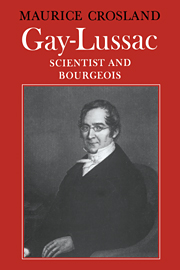Book contents
- Frontmatter
- Contents
- Preface
- Chronological table
- List of abbreviations
- 1 A young provincial in Paris
- 2 The apprentice of Arcueil
- 3 Personal influences and the search for laws
- 4 Collaboration and rivalry
- 5 The volumetric approach
- 6 Scientific research
- 7 Professor, Academician and editor
- 8 A scientist in the service of government and industry
- 9 A new technique and the dissemination of technical information
- 10 Scientist and bourgeois in the political arena
- 11 The legacy
- Appendix: select correspondence
- Notes
- Select bibliography
- Name index
- Subject index
7 - Professor, Academician and editor
Published online by Cambridge University Press: 03 November 2009
- Frontmatter
- Contents
- Preface
- Chronological table
- List of abbreviations
- 1 A young provincial in Paris
- 2 The apprentice of Arcueil
- 3 Personal influences and the search for laws
- 4 Collaboration and rivalry
- 5 The volumetric approach
- 6 Scientific research
- 7 Professor, Academician and editor
- 8 A scientist in the service of government and industry
- 9 A new technique and the dissemination of technical information
- 10 Scientist and bourgeois in the political arena
- 11 The legacy
- Appendix: select correspondence
- Notes
- Select bibliography
- Name index
- Subject index
Summary
‘I compare the gaylussacites (gaylussaciens) of the Institute of France, or the leaders of this society, to those for whom boasting takes the place of knowing. If they are gaylussacites they would say: “You cannot attack the principles for which we stand, because we are everything, and in so far as you can see anything, it is only through us”.’
H. BodelioIn the life of Gay-Lussac the Revolutionary period (or more precisely the period after 1795) was the time when he received his basic scientific education. During the succeeding period of the Consulate Gay-Lussac was a research assistant to Berthollet, while the ten years of the Empire (1804–14) were for him a period of intensive scientific research. By the Restoration of 1815 Gay-Lussac had established an international reputation for himself. A French ‘Who's Who’ published in 1817 described him as ‘one of the most distinguished physicist-chemists of the capital’. He was now a part of the establishment. He came to replace Berthollet all the more naturally as his master had taken the eclipse of Napoleon as a time to withdraw from the public scene. Although Gay-Lussac had benefited indirectly through Berthollet by Napoleonic patronage he had never been formally associated with the imperial regime. Thus he could serve the restored Bourbon monarchy with a clear conscience, although perhaps not without a tinge of regret for old times. It was under the constitutional monarchy of Louis Philippe that Gay-Lussac reached his peak of power and influence.
- Type
- Chapter
- Information
- Gay-LussacScientist and Bourgeois, pp. 143 - 177Publisher: Cambridge University PressPrint publication year: 1978



